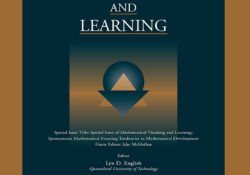eric.ed.gov har udgivet: There is a national need for effective interventions to improve school readiness and subsequent achievement in mathematics for students from low-income families. The purpose of this study was to implement and evaluate a 2-year preschool math intervention that began at preschool entry when children were 3 years of age and continued through the end of the pre-kindergarten (pre-K) year. Three principal objectives will be addressed in this presentation: (1) to evaluate the efficacy of a math curriculum for 3-year-olds implemented in the pre-pre-kindergarten (pre-pre-K) year of preschool; (2) to compare the impact of a 2-year math intervention (implemented during pre-pre-K and pre-K years) with a 1-year math intervention (PK) or a business-as-usual control condition on children’s mathematical knowledge at the end of preschool; and (3) to examine… Continue Reading →
Like this:
Like Loading...
eric.ed.gov har udgivet: Historically, secondary students with emotional behavioral disorders (EBD) have made poor progress in mathematics putting them at risk for school failure and placement in an alternative setting. Two under studied areas essential to success in mathematics are fractions and algebra. The purpose of this study was to test the effects of a multi-component intervention on the math performance for middle school students with EBD in an alternative educational setting. This study used a one-group nonequivalent dependent variables design (Shadish, Cook, & Campbell, 2002) with multiple measures in multiple waves to assess the effects. Repeated measures ANOVA indicated that students significantly improved their math performance on both fractions and algebra using researcher developed measures. Social validity results indicated that teacher and students found the intervention to be an… Continue Reading →
Like this:
Like Loading...
tandfonline.com har udgivet en rapport under søgningen “Teacher Education Mathematics”: ABSTRACT ABSTRACT We report here on an intervention implementing a structural approach to arithmetic problem-solving in relation to learning outcomes among preschoolers. Using the fundamental principles of the variation theory of learning for developing the intervention and as an analytical framework, we discuss teaching and learning in commensurable terms. The research question is how teaching grounded on a structural approach and designed based on principles of variation theory is reflected in children’s learning of numbers. To answer this, three analyses were conducted, addressing: i) how the children’s ways of experiencing numbers changed after participating in the intervention, ii) how the theoretical ideas were afforded in the intervention program, and iii) synthesizing how the affordance was associated with the children’s arithmetic… Continue Reading →
Like this:
Like Loading...
tandfonline.com har udgivet en rapport under søgningen “Teacher Education Mathematics”: ABSTRACT ABSTRACT In this study we investigated the effects of two naturalistic 2- to 4-year-old children’s intervention programs aimed at promoting children’s Spontaneous Focusing On Numerosity (SFON) and early numerical skills. The study consisted of a quasi-experimental, pretest-posttest design with a delayed posttest and an active control group participating in the Let’s Read and Talk program. All conditions had 6 weeks of intensive training followed by a 4-month rehearsal phase, when intervention activities were integrated into normal day care. The results of both numerical interventions in the whole group level show positive, small- to medium-sized long-term effects on cardinality-related skills from pretest to delayed posttest. The SFON tendency increased more from pretest to posttest in both studies but the group differences… Continue Reading →
Like this:
Like Loading...
eric.ed.gov har udgivet: “Accelerated Math®,” published by Renaissance Learning, is a software tool that provides practice problems for students in grades K-12 and provides teachers with reports to monitor student progress. “Accelerated Math®” creates individualized student assignments, scores the assignments, and generates reports on student progress. The software is typically used with the math curriculum being used in the classroom to add practice for students and help teachers differentiate instruction through the program’s progress-monitoring data. This review focuses on studies of the use of “Accelerated Math®” in kindergarten through pre-algebra classes. The What Works Clearinghouse (WWC) identified six studies of “Accelerated Math®” that both fall within the scope of the Primary Mathematics topic area and meet WWC group design standards. Two studies meet WWC group design standards without reservations, and… Continue Reading →
Like this:
Like Loading...
eric.ed.gov har udgivet: The purpose of the present study was to test the efficacy of a modified cognitive strategy instructional intervention originally developed to improve the mathematical problem solving of middle and high school students with learning disabilities (LD). Fifth and sixth grade general education mathematics teachers and their students of varying ability (i.e., average-achieving [AA] students, low-achieving [LA] students, and students with LD) participated in the research study. Several features of the intervention were modified, including (a) explicitness of instruction, (b) emphasis on meta-cognition, (c) focus on problem-solving prerequisites, (d) extended duration of initial intervention, and (e) addition of visual supports. General education math teachers taught all instructional sessions to their inclusive classrooms. Curriculum-based measures (CBMs) of math problem solving were administered five times over the course of the… Continue Reading →
Like this:
Like Loading...

